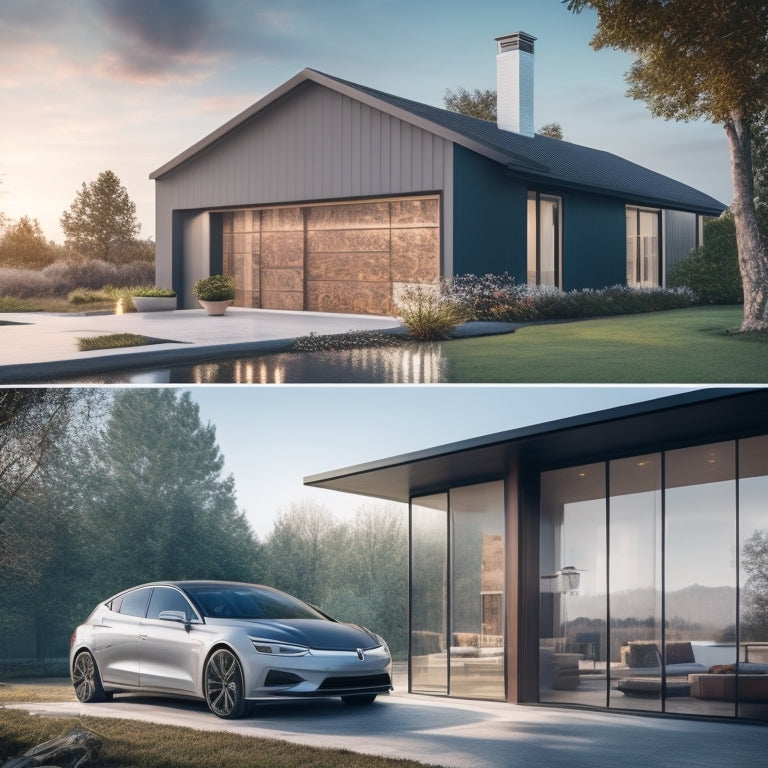
Maximize EV Range: Smart Window Insulation Methods Revealed
Share
You can greatly enhance your electric vehicle's range and performance by incorporating smart window insulation methods that minimize heat transfer, reduce energy consumption, and maximize energy efficiency. By insulating window frames, using low-E glass, and applying energy-efficient window coatings, you can lower energy consumption by up to 40%. Additionally, consider installing smart glass, dual-pane windows, and insulated window shades to further optimize your vehicle's climate control system. By implementing these strategies, you'll not only conserve energy but also reduce your environmental impact - and there's even more to investigate when it comes to maximizing your EV's range.
Key Takeaways
- Insulate window frames with materials like vinyl, fiberglass, or wood to reduce heat transfer and energy loss.
- Use energy-efficient glass solutions like low-E glass, smart glass, and window coatings to minimize heat transfer and reduce energy consumption.
- Apply window films and shades to block heat transfer, regulate natural light, and enhance climate control system efficiency.
- Install dual-pane windows to improve thermal insulation, reduce noise, and enhance aesthetic appeal.
- Seal air leaks around windows and doors to maintain insulation effectiveness and uphold energy efficiency.
Insulating Window Frames Matters
Since window frames are responsible for a significant portion of heat transfer, insulating them is crucial to minimize energy losses and reduce your energy bills. You need to choose the right frame materials for the job.
Vinyl, fiberglass, and wood frames with insulation-filled cavities can provide adequate thermal breaks. Additionally, incorporating renewable energy solutions like solar panels on fleet vehicles can further reduce reliance on fossil fuels and carbon footprint. By utilizing hybrid electric solutions, fleet owners can lower emissions and improve fuel efficiency.
Aluminum frames, on the other hand, are poor insulators and may require additional insulation measures. When it comes to installation techniques, you should guarantee a proper seal between the frame and the surrounding wall to prevent air leaks. Proper flashing and weatherstripping can also help reduce heat transfer.
Low-E Glass for Energy Savings
Maximize your energy savings by specifying low-E glass for your windows. This type of glass features a thin, metallic coating that reduces heat transfer, minimizing the flow of heat into or out of your vehicle.
By reducing heat gain in the summer and heat loss in the winter, low-E glass greatly improves energy efficiency. When designing an EV charging station, it's crucial to optimize solar panel array design to guarantee maximum energy production.
This leads to cost savings, as your electric vehicle's climate control system won't have to work as hard to maintain a comfortable temperature. In fact, low-E glass can reduce energy consumption by up to 40%.
Window Film for Thermal Insulation
Window Film for Thermal Insulation
You've already taken a significant step towards energy efficiency by specifying low-E glass for your windows.
Now, consider taking it to the next level with window film for thermal insulation. This additional layer provides an extra barrier against heat transfer, reducing energy losses and keeping your EV's cabin comfortable.
By utilizing solar power for EV charging, you can further reduce your carbon footprint charging during peak sunlight hours. Additionally, integrating solar power into your daily routine can lead to a significant reduction in grid reliance.
-
Reduced heat gain: Window film blocks out infrared radiation, minimizing heat gain during summer months and keeping your EV cooler.
-
Improved privacy: Privacy window films can reduce visibility from the outside, providing an added layer of security and privacy.
-
Enhanced aesthetics: Decorative window films come in various patterns and designs, allowing you to customize your EV's appearance.
- Increased energy efficiency: By reducing heat transfer, window film helps your EV's climate control system work more efficiently, preserving your battery's range.
Dual-Pane Windows for EV Owners
Behind the windshield of your EV, dual-pane windows offer a considerable upgrade in thermal insulation, building upon the benefits of low-E glass and window film.
By sandwiching a gas-filled gap between two panes of glass, you'll enjoy improved energy efficiency, noise reduction, and aesthetic appeal. This setup is cost-effective in the long run, as it reduces heat transfer and minimizes the load on your EV's climate control system.
Furthermore, it's crucial to evaluate Renewable Energy Sources for EV charging, which can greatly impact your carbon footprint.
When installing dual-pane windows, guarantee proper sealing to maintain the insulating properties. Regular maintenance involves cleaning the windows and checking for air leaks.
This eco-friendly upgrade reduces your environmental impact, provides UV protection, and increases your home value.
With dual-pane windows, you'll reap long-term savings and drive further on a single charge.
Insulated Window Shades Benefits
By incorporating insulated window shades into your EV owner's toolkit, you'll reveal a wealth of benefits that extend beyond mere aesthetics.
These shades offer more than just a stylish touch to your vehicle's interior. Moreover, they can contribute to enhanced energy efficiency gains by reducing heat transfer and minimizing the load on your EV's climate control system, which is essential for maximizing your range.
In addition, they can also support a cleaner environment by promoting the use of clean energy.
-
Light Control: Insulated window shades allow you to regulate the amount of natural light entering your EV, reducing the need for artificial lighting and minimizing heat gain during summer months.
-
Privacy Enhancement: With insulated window shades, you can enjoy increased privacy while maintaining visibility, making them ideal for EV owners who value their personal space.
-
Energy Efficiency: By reducing heat transfer, insulated window shades help maintain a comfortable cabin temperature, minimizing the load on your EV's climate control system and maximizing your range.
- Noise Reduction: These shades can also help reduce external noise, creating a more peaceful and comfortable driving experience.
Smart Glass for Climate Control
In conjunction with insulated window shades, smart glass for climate control is emerging as a breakthrough in the EV industry, offering unparalleled thermal management and energy efficiency.
You can utilize the power of smart glass technologies to optimize your EV's climate control system. By actively adjusting the glass's thermal properties, you can reduce the load on your vehicle's HVAC system, conserving energy and extending your driving range.
Climate control innovations like electrochromic glass, which changes opacity with an electric current, allow you to fine-tune the amount of heat and light entering your vehicle.
This state-of-the-art tech enables you to create a comfortable, personalized climate while minimizing energy consumption, giving you the freedom to drive further and longer.
Seal Air Leaks for Efficiency
Your vehicle's windows are only as efficient as the seals that surround them. A single air leak can greatly reduce your EV's range, making it essential to identify and seal any gaps.
For effective air leak detection, follow these steps:
-
Inspect weather stripping: Check the condition and adhesion of weather stripping around doors and windows.
-
Use a smoke test: Turn off the climate control and use a smoke pen to detect air leaks around windows and doors.
-
Check door and window alignment: Verify proper alignment to prevent air leaks.
- Apply new weather stripping: Replace old or damaged weather stripping to maintain a tight seal.
Window Coatings for Energy Efficiency
You can considerably reduce heat transfer and energy loss through your windows by applying specialized coatings.
Thermal insulation coatings, for instance, can minimize conduction and convection, while energy-saving films can reduce radiation.
Additionally, solar reflective tints can block unwanted solar heat gain, allowing you to control the amount of heat that enters your building.
Thermal Insulation Coatings
Advanced materials science has given rise to thermal insulation coatings, a breakthrough solution for enhancing window energy efficiency. You can now enjoy the insulation benefits of a thermal barrier on your vehicle's windows, reducing heat transfer and minimizing energy losses.
These coatings create a thin, transparent layer that blocks heat flow, keeping your EV's interior cooler in the summer and warmer in the winter.
Here are some key advantages of thermal insulation coatings:
-
Reduced heat transfer: Minimizes energy losses, keeping your EV's interior comfortable and reducing the load on your climate control system.
-
Improved energy efficiency: Helps maximize your EV's range by reducing the energy needed to heat or cool the interior.
-
Enhanced comfort: Maintains a consistent interior temperature, ensuring a comfortable ride regardless of the outside weather.
- Increased freedom: Gives you the freedom to drive further, without worrying about running out of charge, while enjoying a comfortable and energy-efficient ride.
Energy Saving Films
The vehicle's windows are a significant source of energy loss, but energy saving films can effectively mitigate this issue.
These films reduce heat transfer through the glass, minimizing the load on your EV's climate control system. By doing so, you can enjoy improved energy efficiency and a longer driving range.
When selecting an energy saving film, consider the cost analysis: while the initial investment may seem steep, the long-term energy savings will pay off.
Look for films with high visible light transmission to minimize glare and guarantee peak visibility.
With the right energy saving film, you can enhance your EV's performance, reduce energy consumption, and maximize your freedom on the road.
Solar Reflective Tints
Enhancing your electric vehicle's energy efficiency requires a complex approach, and solar reflective tints are an essential component in this effort.
By applying these tints to your windows, you can reduce the amount of solar energy entering your vehicle, which in turn reduces the load on your air conditioning system. This results in increased energy efficiency and extended range.
Here are the benefits of solar reflective tints:
-
Blocks up to 80% of solar energy: Reduces heat gain and keeps your vehicle cooler.
-
Improves interior comfort: Reduces the need for air conditioning, promoting a more comfortable driving experience.
-
Increases energy efficiency: By reducing the load on your air conditioning system, you can achieve better fuel economy and extended range.
- Enhances visibility: Reduces glare and reflections, providing a clearer view of the road ahead.
Frequently Asked Questions
Can Window Insulation Methods Affect My Ev's Overall Performance?
You're wondering if window insulation methods can impact your EV's overall performance. Yes, they can! By improving energy efficiency and temperature regulation, you'll optimize your vehicle's energy consumption, leading to enhanced performance and a smoother ride.
Are There Any DIY Window Insulation Methods for EV Owners?
You can create your own DIY window insulation solutions using affordable materials like acrylic sheets, thermal curtains, or reflective window films, and applying techniques like layering, gapping, or magnetizing to effectively reduce heat transfer and enhance your EV's energy efficiency.
Do Window Insulation Methods Work for All Types of Evs?
"When in Rome, do as the Romans do" - in this case, optimizing your EV's range. You'll find that window insulation methods work for most EVs, but their effectiveness depends on vehicle type compatibility, so it's crucial to research and choose the right solution for your ride.
Can Smart Window Insulation Methods Be Installed on Older Evs?
You can retrofit smart window insulation methods on older EVs using specialized retrofit options that integrate advanced insulation materials, ensuring a seamless installation process that enhances your vehicle's energy efficiency and gives you the freedom to go further.
Are There Any Government Incentives for EV Window Insulation Upgrades?
You'll be pleased to know that you can tap into federal rebates and local grants to offset the cost of EV window insulation upgrades, giving you the freedom to upgrade your ride while staying within budget.
Related Posts
-

3 Best Solar-Powered Biodegradable Accessories for Your Home
You're taking a significant step towards a more sustainable lifestyle by incorporating solar-powered biodegradable ac...
-

What Do Power Strips Do for Standby Energy?
You're likely aware that your devices, such as TVs and computers, continue to draw power even when turned off, a phen...
-

7 Best Home Hydrogen Fuel Cells for Clean Power
You're considering adopting hydrogen fuel cells for clean power at home, but you want to know the best options. Reput...


